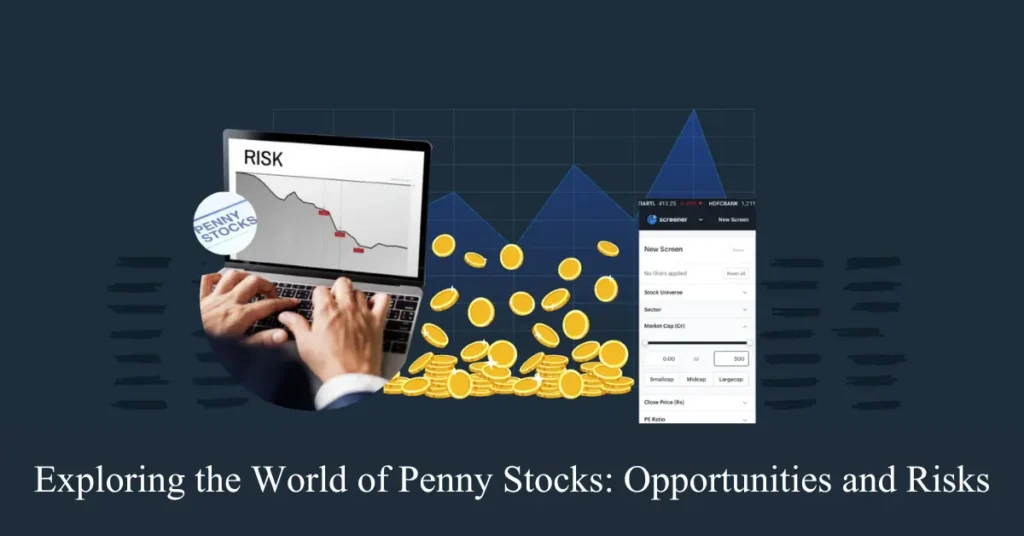If you are new to stock market trading, you could have come across a group of inexpensive stocks. Typically, stock market lower levels are where one may find them. Penny stocks are these. These are issued by businesses with a market value of less than Rs 5,000 crore. Investing in penny stocks takes attention and caution since they carry a high risk and have the potential to yield profits that are above average. Few full-service brokerages even sell penny stocks to their clients due to the inherent dangers associated with them.
Shares that are traded for less than $1 are commonly referred to as penny stocks. Others characterize them as equities that are valued at less than $5. However, penny stocks, also known as microcap stocks, are defined by the Securities and Exchange Commission (SEC) as stocks with a market value of less than $250 million. Penny stocks often trade on the OTC Bulletin Board (OTCBB) or the so-called Pink Sheets. Approaching both interactions with great caution is advised. This is particularly true for the Pink Sheets since, in contrast to OTCBB stocks, the firms who trade there are not required to file with the SEC. Additionally, you shouldn’t get too excited about trading on the OTCBB. Finding sufficient reliable data to draw a well-informed opinion on the company’s chances of surviving, much less thriving, is challenging. Remember that a firm does not need to meet any minimum requirements in order to stay listed on the OTCBB or the Pink Sheets. Free penny stock newsletters are frequently used to advertise these pump-and-dump scams. These canines are promoted by payment to the publisher, writer, or both. Read the small print on the penny stock newsletter’s website if you receive one. A financial tie with stock promoters can be revealed. What is fundamental analysis? It also entails determining how macroeconomic variables affect the functioning of an organization. This is the pump-and-dump’s antithesis. In this instance, the con artists profit from short sales. A short seller is a financial player who is betting on a stock’s decline in value. Penny stock fraudsters short-sell a stock, then use malicious rumours about the firm to ensure that its price drops.
A private firm may combine with a public corporation on occasion in order to go public without the trouble and cost of using conventional listing procedures. This facilitates the private company’s ability to inflate its stock price and fabricate its earnings. Even though some reverse mergers are legitimate, you may identify one by looking at the company’s past and looking for irregularities in its merger activities. The appeal of gold, diamonds, and oil has never faded, and mining frauds have existed throughout human history.
Bre-X was one of the most well-known mining frauds in the middle of the 1990s. David Walsh, the founder, made up the story that his business had found a huge gold mine in Burma. By 1997, speculation had driven the company’s worth, which was based solely on penny stocks, to $4.4 billion. A guru might be anyone with a budget for advertising. Alas, they frequently attract a devoted fan base.
False advertising of this kind claims to disclose a particular secret that the financial expert utilized to buy a luxury automobile and a lakeside house. For a one-time minimal payment, the expert offers to share with you the secrets of penny stock trading. Throw away the envelope or email. In the stock market, there is no one-size-fits-all route to financial success. Steer clear of sales pitches from those posing as the next Thomas Edison and invite you to invest in the greatest invention since the lighting. Stock shares are offered by the con artists, but they come with a catch: they can’t be sold again for a set amount of time. Investors are informed that this stock is in high demand.
The investors are left with nothing when the SEC finally takes action to stop these schemes. When selling to American investors, foreign companies are exempt from the requirement to register their shares in the United States. Scammers of penny stocks adore this. They purchase shares in unregistered, inexpensive overseas companies and then overcharge investors for the stock. The price of the company’s stock declines as a result of this inflow of unregistered shares. While American investors receive next to nothing, the crooks profit. Newsletter writers are hired by promoters to provide positive stories about their stocks. Through the use of exaggeration, irrational predictions, and, in certain situations, purposeful distortion, they present a compelling case for investing in fraudulent penny stocks. These advertisements resemble authentic study papers quite a bit. The ability to differentiate between equities research and stock marketing is a necessary skill for penny stock investors. One method to find out if the author is receiving direct compensation from the firm they are endorsing is to read the disclosures section included at the conclusion of the report. Typically, this compensation takes the form of a combination of shares and cash. Although penny stock businesses often don’t provide detailed financial information, it never hurts to double-check the financial statements that they offer.
Examine the balance sheet closely to determine the company’s net cash position and whether any significant debt or obligations are present. It’s encouraging if the income statement demonstrates a sharp increase in revenues recently. Penny stocks carry a significant risk. You may have higher odds at a casino. Even if there may be short-term profit opportunities, choose a long-term lucrative strategy by investing in well-established businesses. It could be preferable to look at firms trading between $3 and $5 if you want to commit some funds to speculative trades. However, don’t take action until you’ve done a lot of study and are certain of your opinion.
